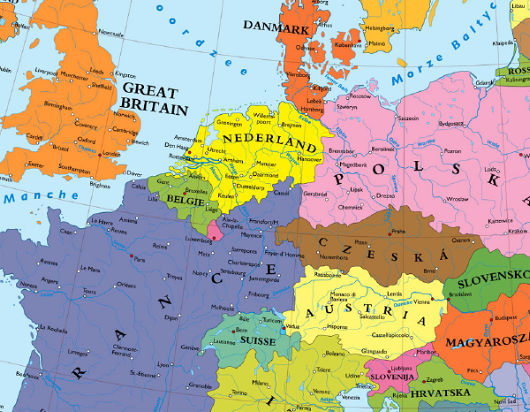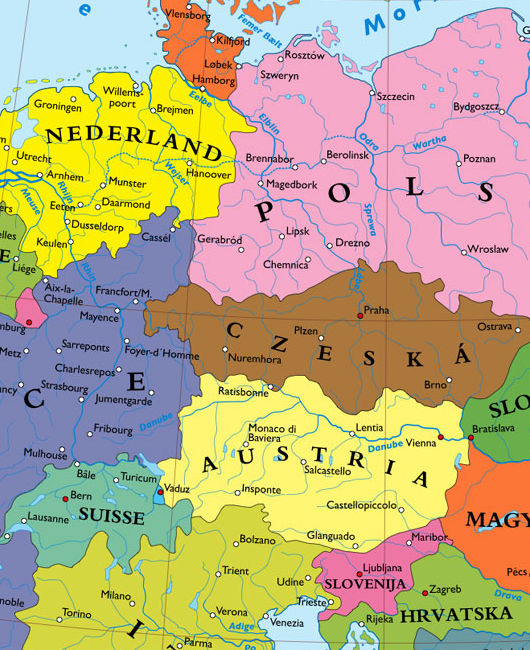
About Andrew Cusack
 Writer, web designer, etc.; born in New York; educated in Argentina, Scotland, and South Africa; now based in London.
Writer, web designer, etc.; born in New York; educated in Argentina, Scotland, and South Africa; now based in London. read more
News
Blogs
Reviews & Periodicals
Arts & Design
World
France
Mitteleuropa
Knickerbockers
Argentina
The Levant
Africa
Cape of Good Hope
Netherlands
Scandinavia
Québec
India
Muscovy
Germany
Academica
Germany carved amongst her neighbours

What is this cartographic madness? Hanover part of the Netherlands? Kassel ruled by France? Nuremburg part of a Bohemia that reaches to the Frankfurt suburbs? Hamburg in Denmark? Regensburg on the Austro-Czech border? I came across the company Kalimedia in an article from Die Zeit a month or two ago and discovered their map of a Europe without a Germany. Believe it or not, there were plans of one sort or another to achieve similar results at the end of the Second World War. The major plan for the dissection of Germany was merely a creation of Nazi propaganda, and while the vaguely similar Morgenthau Plan did exist, it was soon shelved once its impracticality became obvious.
The Bakker-Schut Plan, meanwhile, was a Dutch proposal for the annexation of several German towns, and perhaps even a number of German cities. German natives would be expelled, except for those who spoke the Low Franconian dialect, who would be forcibly dutchified. They even came up with a list of new Dutch names for German cities: c.f. the post at Strange Maps on “Eastland, Our Land: Dutch Dreams of Expansion at Germany’s Expense”.

Search
Instagram: @andcusack
Click here for my Instagram photos.Most Recent Posts
- How to Make a Pope April 24, 2025
- Faithful Shepherd of the Falklands April 8, 2025
- Articles of Note: 8 April 2025 April 8, 2025
- Proportionality Destroys Representation April 8, 2025
- Sag Harbor Cinema March 26, 2025
Most Recent Comments
Book Wishlist
Monthly Archives
Categories



What a laugh – I almost wished they’d tried. The Poles would now be speaking German, and not vice-versa. The French would have been thrown out after ten years or so and the new Reich would extend to Reims at least.
On the other hand, I can see the Dutch and Austrian Germanies flourishing: the first an interesting and prosperous group of Hanseatic statelets; the second a gloriously Ruritanian collection of Catholic prinicipalities.
Hmn … I think I’ve won myself over to the idea!
Why the cities of Austria in the map are written in italian?!!
Although the Church and State entities involved are in agreement with the status quo, many consider what is now western Poland to be the last remnant of a “partitioned” Germany after WWII.
Don’t you read your own link? The Morgenthau plan was all too real and strongly influenced American policy through 1947 and to some extent even beyond.
There were a couple of German towns that were taken over by the Netherlands after the War as “reparations” but were susequently returned.
Don’t you read the post you bother to comment about, Mr. Chessman? Cusack clearly states above that the Morgenthau plan did in fact exist.
Mark R,
I sincerely doubt that the “many” who think that western Poland constitutes some manner of remnant Germany — you’d have a very hard-pressed time going up against 38,116,000 Poles and 10,000,000 Polish-Americans, of which I am one.
I do not care for this brand of monarchy/empire mongering, especially when it includes facist regimes and nazism.
If, perhaps, I have guessed your position incorrectly, I apologize. Nevertheless, the fact remains that Poland’s postwar borders did nothing of the sort suggested in your comment. Wroclaw has been Polish since before the Baptism of Duke Miesko in 966. When the Holy Roman Empire, itself, began, what is now western Poland wa inhabited by Slavic tribes who would eventually come to form the Polish state in said year.
Implying that western Poland, e.g., Wroclaw, Poznan, and Szczecin, etc, is really part of Germany, would be to say that the Six Counties are part of Britain. The wishful scheming of fascists, nazis, imperialists, communists, monarchists, and other assorted Franco-packers will never squash the indomitable spirit of free peoples living under God and the rule of law.
“Implying that western Poland is really part of Germany, would be to say that the Six Counties are part of Britain.”
But… the Six Counties are part of Britain.
(Or “the United Kingdom of Great Britain and Northern Ireland” to be precise).
“Implying that western Poland, e.g., Wroclaw, Poznan, and Szczecin, etc, is really part of Germany, would be to say that the Six Counties are part of Britain.”
YEAH! The Six Counties part of Britain?!?!?!? That’s like saying HAWAII is part of the United States!!!
IS OUTRAGE!™
German claims to the land: within living memory.
Polish claims to the land: a thousand years ago.
Watching a Hyphenated-American FREAK OUT when his ethnic chauvinism is challenged and he encounters traditional Catholic culture: priceless
Mr. Harrington,
Please reread the original post. the clear implication is that the Morgenthau plan was a relatively minor matter that was disposed of as “soon as its impracticality became obvious.” But that moment when the impracticality “became obvious” only only came 2-3 years after the war ended during the most critical period of US – soviet realtions.
To be fair, this plan, while influential was never literally implemented. If it had been, genocide by starvation in Germany and the collapse of the entire European economy would have been the result. This plan was a very serious matter.
I am sure Mr.JPM does not apply the same historical criteria to Polish claims in the eastward direction…..
In fact, Polish people had never ‘wanted’ Wrocław (Breslau) or Szczecin (Stettin) because this part of Poland (or rather the Land of Poles) naturally (and gradually) became a part of Germany and they were not Polish cities anymore. However,this land was “given” as a dubious compensation for Eastern Lands during the Jałta Conference, while territories really connected (historically and culturally) with Poland were brutally incorporated by the USSR (it was the begginig of a “mental starvation” for culture of that places like Lwów or Wilno under the communist’s regime).
Nobody was asked, there were not ‘plebiscyt-Plebiszit’. To state clearly, in modern Europe there is no place for any ‘claims’-we should cooperate to create culture with awarness of the history: both in Western Poland an in Western Ukraine, Litva and Belarussia , like in the rest of Europe. The history is not so simple …
Andrew Cusack:
Ditto Brunopolski.
I lived in Poland for two years and travelled extensively in Silesia, I speak Polish and studied Polish history and literature. I know there were Polish roots in Silesia and western Poland in the Middle Ages, but this was all before the nation-state. Poles and the Polish language were virtually unknown in Silesia west of the Oder for centuries. I hold no brief for Polish or German nationalism…I am Carpatho-Russian and Italian. The annexation and ethnic cleansing of Silesia and other recovered lands was all a Communist project with a view to punishing Germany and aquiring an industrial base to contribute to the formation of a proletariat to further Communist designs. Compensation for losing the eastern territories to the U.S.S.R. was part of it too. A massive, oppresive migration of peoples followed, such that some of the largest concentration of Eastern Catholic and Orthodox faithful live in western Poland (they willing owned Polish ethnicity to avoid being placed in the Soviet Union). Railroad traffic on All Souls Day is madness in Poland one’s sides ancestral territory is on the other side of the country and vice versa. I continually ran into older Germans travelling by train to return to visit their birthplaces in Poland…a lot were bilingual and would only speak Polish while on Polish territory and German while in Germany. Read “Microcosm: Portrait of a Central European City” by Norman Davies and Roger Moorehouse…it’s about the Wroclaw area and is a good read. As for me, I am comfortable with the nation state borders as they are now…no need to muddy the waters further.
What an interesting set of maps. Crazy, but no more lunatic than what happened to Europe post 1918, or post 1945.
The recreation of the Polish state was a blessing, but I could wish it had not been at the expense of eastern Germany. Europe and the world lost much when Königsberg, Breslau, Allenstein, Stettin, Bromberg et al acquired other names and residents. But I wish also that Poland (that is, Congress Poland plus what it acquired from the Russian Empire upon independence), could have retained what it lost by the Hitler-Stalin pact.
That said, there is no way of undoing any of that now that could ever be remotely worth it. Hopefully the era of European border changes by war has at last ended.
Although that map warms the heart (Berolinsk! Hamborg! Nuremhora!), it makes no sense. Whatever it may be, it has nothing to do with possible post WW2-plans. I mean: why is Yugoslavia and Czechoslovakia split up? Why do the cities in Austria have English and Italian sense (Monaco di Bavaria is supposed to be Munich??) What’s up with the Italian-French border?
Why are Belgium and Switzerland left out in splitting the cake?